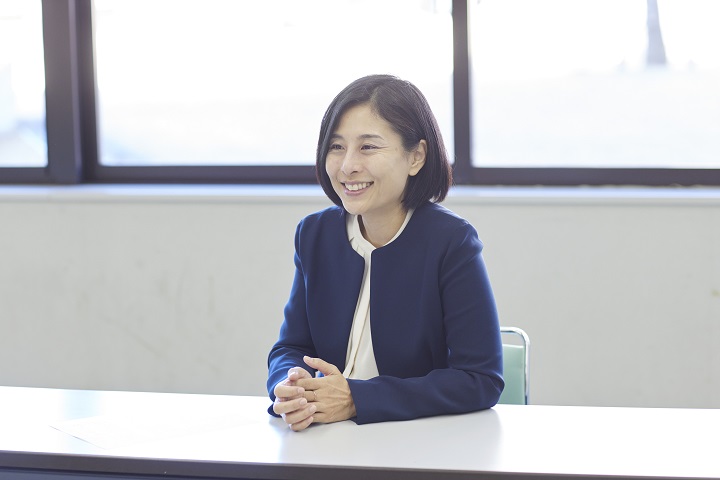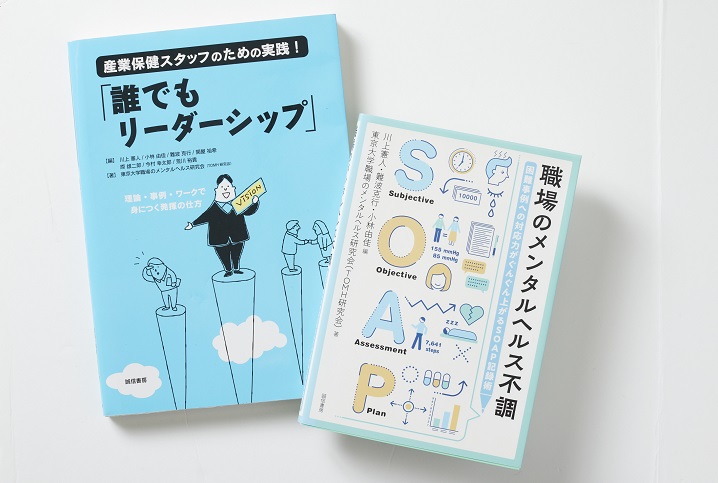reseach
Towards Creating an Environment Where Everyone Can Find Meaningful Work: Enhancing Well-being from a Psychological Perspective
Yuka Kobayashi, Associate Professor
Department of Clinical Psychology, Faculty of Social Policy and Administration
Posted Apr.15,2024
What prompted you to start your research?
In addition to my interest in psychology and behavioral science, my family ran its own business. Since I had the opportunity to witness the difficulties of managing people first hand, I became interested in working in a field that provides support to working people. During my undergraduate and graduate years, I studied experimental psychology, clinical psychology and preventive medicine. After attaining my graduate degree, I worked as an occupational health professional in a corporate setting, providing counseling and research on methods for reducing stress and enhancing employees’ well-being. At present, the correlation between the workplace environment and the mental health of working people is gaining social recognition, and progress is being made in the implementation of various measures and the verification of benefits. There is still an insufficient number of professionals working in this field. Considering this situation, I joined Hosei University to utilize my accumulated practical experience and contribute to the development of the next generation.
*Well-Being = State of living healthy and happily Being physically, mentally and socially satisfied.
Explain the major details of your current research
The number of companies that introduced telework (remote work) as one of the triggers for COVID-19 has increased. Although it has improved work efficiency, it is not uncommon for people who have not yet adapted to their workplace or people who have weak relationships in the workplace to become exhausted or out of shape due to poor communication. Therefore, we are conducting a survey of psychological impact of teleworking on workers and researching measures to improve it. Also, for workplaces facing challenges with “support functions,” owing mainly to a weak psychological sense of belonging among workers or poor leadership among supervisors, an intervention program is being developed to encourage their networks.
As a part of research activities, we are conducting interviews with management. A trend has come to light showcasing the fact that, in contrast with large companies, managerial resources and awareness for mental health care is poor at small and medium-sized enterprises (SMEs), particularly micro-businesses. As one solution, we are also working on the development of e-learning based remote support program to prevent mental health problems in SMEs.
What is work engagement, which has been gathering attention in recent years?
Work engagement is a concept advocated by Professor Wilmar Schaufeli, a psychologist from the Netherlands. This concept was devised in contrast to the burnout syndrome, which is a loss of motivation due to overwork. This refers to the state where “people take pride in their work, work enthusiastically, and work energetically by gaining energy from their job.” This differs from workaholism, which is a compulsion to work due to the belief of an employee that the workplace will not function if they do not do their work and somehow feeling anxious if they do not work. As work engagement grows, work becomes enjoyable, and a sense of fulfillment of being needed by others can be gained from work. Consequently, it becomes more difficult for a worker to become depressed and makes it easier to gain support from those around them. The word “karoshi” has become known worldwide. As this indicates, work engagement is also an extremely important concept even in Japan, which is facing a variety of issues in its work environment. Through a series of research studies, I aim to contribute to an improvement in work engagement in more people.
How is your research useful to society?
Last year, I was involved in a “study group concerning workstyles in a new age,” which was set up by the Ministry of Health, Labour and Welfare. This study group, factoring in changes in society and technological innovations, discussed direction ahead of reviewing laws concerning labor. From my position, I have recommended necessary ideas to create an environment that protects the health of workers and where workers can feel fulfilled in their work. Going forward, I plan to actively give back to society through these initiatives and by leveraging the knowledge gained through research.

[Column] Easy to implement mental healthcare
Step 1: Showing gratitude to those around you
For both students and working adults, the majority of worries arise from relationships with people. Meanwhile, interpersonal relations can also alleviate stress. It is pointed out that people who have habit of being thankful to others have higher levels of happiness compared to those who do not.
Step 2: Confront the reasons for your feelings
Let’s face your feelings of irritation or anxiety that arise during chats with others. Behind these feelings are those “things you aim to value.” What is it you wanted to value when these feelings arise?
Step 3: Think about methods for protecting those things “you want to value”
If you repeatedly have negative feelings, think of ways to protect the “things you aim to value” that are behind these feelings. Also, it is important to see things from a different perspective. Your resilience to stress will improve simply by being aware of these things on daily basis.
Point!
“Exercise,” “Sleep,” and “Breathing” are important, not just think with your head
- Stretching is beneficial in easing stress
- Feel less stress with an appropriate amount, rhythm and quality of sleep
- Adjust your autonomic nervous system by breathing slowly and deeply
Books
(1)Let's Practice! "Leadership Anyone Can Do" for Occupational Health Professional
University of Tokyo Occupational Mental Health Research Group; Authored and edited by Yuka Kobayashi and six others
Publisher: Seishin Shobo, Ltd.; Published: May 2022
Focus on leadership not based on authority, as a required skill for occupational healthcare staff. This book aims to instruct readers on methods to exert this skill through theories, case studies and work. This supports advancement leading up to the point of improvement to mental healthcare in the workplace while obtaining the support of those around you.
(2)Workplace Mental Health Issues: Boosting Response Skills with SOAP Record Method for Challenging Cases
University of Tokyo Occupational Mental Health Research Group; Authored and edited by Yuka Kobayashi and two others
Publisher: Seishin Shobo, Ltd.; Published: June 2021
Regarding a method for creating interview records in the field of occupational healthcare, people can specifically learn steps from the basics to practices using this book. There are examples of on-site interviews. In addition to questions and explanations, there are also examples of actual recorded cases. Readers can acquire practical knowledge, including how to address difficult cases and the risk of lawsuits.

Realize Future Dream through Research
I would like to increase the number of colleagues who share the same awareness of the same issues and principles in order to spread more widely in society the ways to enhance the well-being of workers. To realize this, it is essential to build a bridge between companies and educational and research institutions. Moving forward, I plan to undertake various measures, including hosting a program to train working people to become professionals.
Yuka Kobayashi, Associate Professor
Department of Clinical Psychology, Faculty of Social Policy and Administration
Completed doctoral program at the Graduate School of Medicine, Dentistry and Pharmaceutical Sciences (Field of Hygiene and Preventive Medicine) at Okayama University. Worked as a professional psychologist at companies, including JFE Steel Corporation and Honda Motor Co., Ltd. Mainly involved in counseling related to mental health and careers, consultations with superiors, education and training, analysis of and measures for stress check surveys, and formulation of policies at business sites. Current position from 2022.

